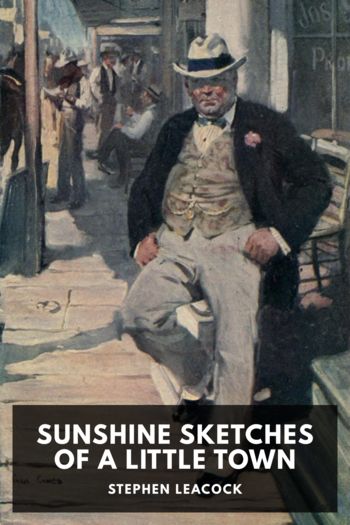Sunshine Sketches of a Little Town by Stephen Leacock (the false prince TXT) 📕

- Author: Stephen Leacock
Book online «Sunshine Sketches of a Little Town by Stephen Leacock (the false prince TXT) 📕». Author Stephen Leacock
For a moment as his eye rested on young Pupkin you would almost have imagined, had you not known that he came from the Maritime Provinces, that there were tears in them and that he was about to hug his son to his heart. But if he didn’t hug Peter to his heart, he certainly did within a few moments clasp Zena to it, in that fine fatherly way in which they clasp pretty girls in the Maritime Provinces. The strangest thing is that Pupkin senior seemed to understand the whole situation without any explanations at all.
Judge Pepperleigh, I think, would have shaken both of Pupkin senior’s arms off when he saw him; and when you heard them call one another “Ned” and “Phillip” it made you feel that they were boys again attending classes together at the old law school in the city.
If Pupkin thought that his father wouldn’t make a hit in Mariposa, it only showed his ignorance. Pupkin senior sat there on the judge’s verandah smoking a corn cob pipe as if he had never heard of Havana cigars in his life. In the three days that he spent in Mariposa that autumn, he went in and out of Jeff Thorpe’s barber shop and Eliot’s drug store, shot black ducks in the marsh and played poker every evening at a hundred matches for a cent as if he had never lived any other life in all his days. They had to send him telegrams enough to fill a satchel to make him come away.
So Pupkin and Zena in due course of time were married, and went to live in one of the enchanted houses on the hillside in the newer part of the town, where you may find them to this day.
You may see Pupkin there at any time cutting enchanted grass on a little lawn in as gaudy a blazer as ever.
But if you step up to speak to him or walk with him into the enchanted house, pray modulate your voice a little musical though it is—for there is said to be an enchanted baby on the premises whose sleep must not lightly be disturbed.
X The Great Election in Missinaba CountyDon’t ask me what election it was, whether Dominion or Provincial or Imperial or Universal, for I scarcely know.
It must, of course, have been going on in other parts of the country as well, but I saw it all from Missinaba County which, with the town of Mariposa, was, of course, the storm centre and focus point of the whole turmoil.
I only know that it was a huge election and that on it turned issues of the most tremendous importance, such as whether or not Mariposa should become part of the United States, and whether the flag that had waved over the school house at Tecumseh Township for ten centuries should be trampled under the hoof of an alien invader, and whether Britons should be slaves, and whether Canadians should be Britons, and whether the farming class would prove themselves Canadians, and tremendous questions of that kind.
And there was such a roar and a tumult to it, and such a waving of flags and beating of drums and flaring of torchlights that such parts of the election as may have been going on elsewhere than in Missinaba county must have been quite unimportant and didn’t really matter.
Now that it is all over, we can look back at it without heat or passion. We can see—it’s plain enough now—that in the great election Canada saved the British Empire, and that Missinaba saved Canada and that the vote of the Third Concession of Tecumseh Township saved Missinaba County, and that those of us who carried the third concession—well, there’s no need to push it further. We prefer to be modest about it. If we still speak of it, it is only quietly and simply and not more than three or four times a day.
But you can’t understand the election at all, and the conventions and the campaigns and the nominations and the balloting, unless you first appreciate the peculiar complexion of politics in Mariposa.
Let me begin at the beginning. Everybody in Mariposa is either a Liberal or a Conservative or else is both. Some of the people are or have been Liberals or Conservatives all their lives and are called dyed-in-the-wool Grits or old-time Tories and things of that sort. These people get from long training such a swift penetrating insight into national issues that they can decide the most complicated question in four seconds: in fact, just as soon as they grab the city papers out of the morning mail, they know the whole solution of any problem you can put to them. There are other people whose aim it is to be broad-minded and judicious and who vote Liberal or Conservative according to their judgment of the questions of the day. If their judgment of these questions tells them that there is something in it for them in voting Liberal, then they do so. But if not, they refuse to be the slaves of a party or the henchmen of any political leader. So that anybody looking for henches has got to keep away from them.
But the one thing that nobody is allowed to do in Mariposa is to have no politics. Of course there are always some people whose circumstances compel them to say that they have no politics. But that is easily understood. Take the case of Trelawney, the postmaster. Long ago he was a letter carrier under the old Mackenzie Government, and





Comments (0)